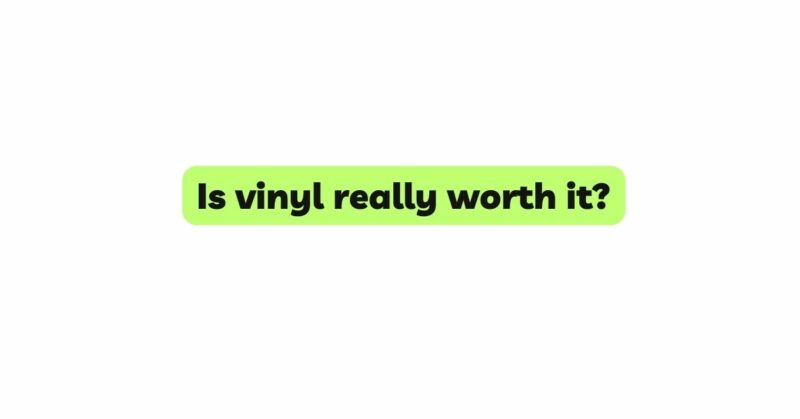In a digital age defined by streaming convenience and instant access to vast music libraries, the resurgence of vinyl records might seem like an enigmatic trend. For many, the allure of vinyl goes beyond nostalgia—it’s about an experience that transcends mere music consumption. However, the question of whether vinyl records are truly worth the investment remains a subject of debate. In this comprehensive exploration, we will delve into the multifaceted aspects that contribute to the perceived worth of vinyl records, considering factors such as sound quality, tangible value, emotional connection, and the broader implications for the music industry and cultural heritage.
The Sonic Experience: Sound Quality
One of the primary factors that influence the worth of vinyl records is their unique sound quality, often touted as being richer and more authentic than digital alternatives.
1. Analog Warmth and Depth: Vinyl’s analog playback creates a warmth and depth that some argue is difficult to replicate in digital formats. The subtle imperfections and harmonic richness contribute to a unique sonic character.
2. Dynamic Range and Nuances: Vinyl’s wide dynamic range preserves the nuances of a musical performance, allowing listeners to experience the full spectrum of sound from the quietest whispers to the most powerful crescendos.
3. Overtones and Harmonics: Vinyl’s ability to retain overtones and harmonics contributes to a sense of realism and texture, enhancing the listening experience and revealing subtleties in the music.
The Tangible Value: Collectibility and Artistry
The worth of vinyl records extends beyond sound quality to their tangible value as collectible artifacts and artistic expressions.
1. Collectible Nature: Vinyl records have intrinsic value as physical artifacts that can be collected, traded, and cherished. Limited editions, rare pressings, and iconic album covers add to their allure.
2. Artistic Presentation: The larger format of vinyl allows for intricate album artwork and liner notes that complement the music, offering a more immersive and aesthetically pleasing experience.
3. Cultural and Historical Significance: Vinyl records are historical artifacts that capture a moment in time. They provide insights into the music culture, trends, and artistic movements of their respective eras.
Emotional Connection and Engagement
Vinyl’s worth lies in its ability to foster a deeper emotional connection to the music and the artist, transcending mere playback.
1. Ritualistic Listening: The act of placing a vinyl record on a turntable, carefully setting the needle, and experiencing the anticipation before the music begins fosters a ritualistic and focused listening experience.
2. Mindful Engagement: Vinyl encourages mindful listening that demands the listener’s full attention, enabling a deeper understanding and connection with the artist’s intent.
3. Nostalgia and Sentimentality: For many, the worth of vinyl is tied to nostalgia—a yearning for a time when music consumption was a tactile, communal, and emotional experience.
The Cost Factor: Economics of Vinyl
While the worth of vinyl records is often intangible, it’s important to consider the economic aspects when evaluating their value.
1. Investment and Resale: Collectible vinyl records can appreciate in value over time, making them not just a source of enjoyment but also a potential investment.
2. Price Discrepancy: Vinyl records, especially limited editions and rare pressings, can be considerably more expensive than digital downloads or streaming subscriptions. This price discrepancy raises questions about whether the premium is justified.
Challenges and Limitations
While vinyl has its undeniable merits, there are challenges and limitations that affect its overall worth.
1. Maintenance and Care: Vinyl records require careful handling, storage, and maintenance to ensure optimal sound quality and longevity. This can be demanding in comparison to the convenience of digital formats.
2. Accessibility and Availability: The resurgence of vinyl has led to increased demand, but limited production capacity can result in challenges related to availability and affordability.
3. Equipment Costs: To fully appreciate vinyl’s benefits, quality playback equipment—such as turntables, amplifiers, and speakers—is necessary, adding to the overall investment.
Conclusion
The worth of vinyl records extends beyond the financial considerations to encompass a holistic appreciation of music as art, culture, and emotion. While vinyl may not be the most practical or cost-effective way to access music, its enduring appeal lies in the unique experience it offers—a connection to the past, an engagement with the present, and a tangible expression of musical artistry. The worth of vinyl records is inherently subjective, varying from person to person based on individual preferences, values, and personal history. In the end, whether vinyl is truly worth it depends on one’s desire for a multisensory, emotionally rich, and tangible connection to music—an experience that remains unrivaled in the digital age.


